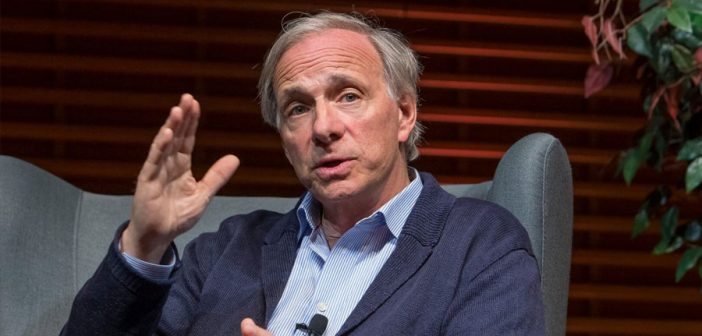The investment icon says a system of thoughtful disagreement creates competitive advantage.
Paperboy. Snow shoveler. Golf caddy — including for Richard Nixon and the Duke of Windsor.
Ray Dalio has had a lot of jobs. But the one he’s best known for is founder and current co-CIO and cochair of Bridgewater Investments, the most successful hedge fund in history and one of Fortune’s five most important private American companies. He has been called the “Steve Jobs of investing” and named one of Time’s Most Influential People. Dalio has also written the bestseller Principles: Life and Work and, more recently, Principles for Navigating Big Debt Crises.
The investor and philanthropist spoke to Stanford GSB students in April as part of the school’s View From The Top series.
Born in Queens, New York, to a jazz musician and a homemaker, Dalio made his first stock market investment at age 12 — in a company verging on bankruptcy. “Another company acquired it, and it tripled in value,” he says. “I thought, ‘This game is easy!’ The game’s not easy, but that’s what got me hooked.”
Dalio continued to invest through high school and college, later enrolling at Harvard Business School, where he studied commodities trading. But entrepreneurship lay just ahead.
Audacity, Not Arrogance
Post-HBS, after working for several investment firms, Dalio decided to work for himself, starting Bridgewater from his two-bedroom apartment. “An entrepreneur or investor has to think differently,” he says. “You have to be audacious.”
But you also have to beware arrogance, as he discovered firsthand: In the early 1980s Dalio predicted long-term economic collapse due to foreign country defaults on American loans. While such defaults, including Mexico’s in 1982, occurred, it was actually a stock market bottom that never led to the longer decline Dalio suggested it would.
Dalio laid off all Bridgewater employees and borrowed money from his father to get through. “I was arrogant before that,” he says. “[Failing] gave me the humility I needed to balance my audacity and made me bring in people who would disagree with me.”
An Idea Meritocracy
Hiring people who would disagree with him meant that Dalio had to create a process to “organize” and resolve disagreement — an “idea meritocracy.” The Bridgewater system of thoughtful disagreement that evolved from that improved the firm’s decisions dramatically, he says.
“If you have a system in which you can fight for your arguments and you know that the system is going to be fair, you can care more,” Dalio says. “That’s the competitive edge.”
An idea meritocracy stands on the pillars of radical truthfulness and radical transparency. “There are two ‘yous,’” Dalio says. “A conscious, thoughtful you that might say, ‘I’d like to know my weaknesses to deal with them.’ But the emotional you might have a harder time.”
Radical transparency means everyone is willing to share their rationales, such as for decision-making, while radical truthfulness enables people to speak how they really feel and challenge others. That brings our potentially misaligned selves closer together, Dalio says.
Go for the Experience
“Go for the experience,” Dalio advised GSB students regarding career choices.
“Find the three or four smartest people dealing with the most important questions you’re facing,” he continued. “Areas of disagreement will bubble to the surface and you’ll learn a lot.”
Not surprisingly, Dalio believes choosing the right organization is all about culture: “Who you’re with and where you are is much more important than what you do.” But that might mean speaking up to improve culture: “Go into your job and say, ‘If something doesn’t make sense to me, do I have the right to say it doesn’t make sense and ask you why it makes sense?’”
Learning from History
Part of Dalio’s — and Bridgewater’s — success has been applying historical lessons to the present: “There are cause-effect relationships, and they repeat through history.” Dalio’s study of the factors contributing to the Great Depression, for example, helped his firm anticipate the 2008 financial crisis.
Now he draws further analogies between the 1930s and today: “Again we have a large wealth gap and rising populism. [In the 1930s] you had the classic rising of a power to challenge an existing power. Then, it was Germany rising to challenge the British Empire. Now we have China rising. And a lot of political polarity. So we’re certainly heading to different kinds of conflicts. The question is: How are we going to handle it?”
Leading with Principles
Dalio suggests a principles-based approach to tricky domestic and global issues: “Are we clear on what principles bind us together as a country [and as a world]? What do we believe in? What are the principles that divide us?”
He points out that those in the top 40% of the U.S. economy spend five times more on their children’s education than those in the bottom 60%, resulting in dramatically unequal opportunity — not an “outcome we want.”
He advocates a bipartisan approach — fueled by thoughtful disagreement — whereby federal and state leadership work on issues like unequal education access with clear principles and metrics. “If we don’t do it together, we’re going to be in trouble.”
–
This article first appeared in www.gsb.stanford.edu
Seeking to build and grow your brand using the force of consumer insight, strategic foresight, creative disruption and technology prowess? Talk to us at +9714 3867728 or mail: info@groupisd.com or visit www.groupisd.com

